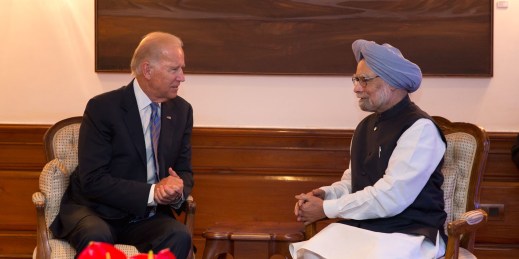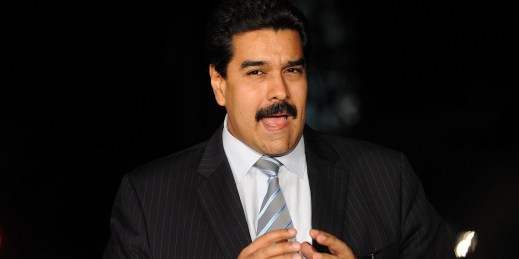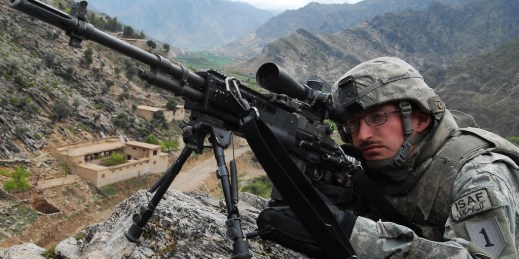Tensions between Moscow and Washington are nothing new, but the growing level of animosity and the dangerous escalation around the political turmoil in Ukraine have ended any remaining illusion that the U.S. and Russia could develop a partnership, working together without rancor toward common goals on the global stage. Now that Ukraine stands on the edge of civil war, with the two sides clearly delineated—one supported, even controlled, by Russia, the other backed by the U.S. and its Western allies—it looks as if the world has undergone a geopolitical backflip. The calendar seems to have been returned to something resembling […]
The Americas Archive
Free Newsletter

As the U.S. considers how to help Nigeria rescue some 276 schoolgirls kidnapped by the militant group Boko Haram a month ago, domestic political attention is turning to the question of what the U.S. could have done ahead of time. In particular, former Secretary of State Hillary Clinton has come under fire for declining to add Boko Haram to the State Department’s list of designated foreign terrorist organizations, or FTO list. The implication is that the U.S. had an opportunity to prevent the kidnapping, and that the FTO list would have helped. Secretary of State John Kerry did eventually add […]

A year ago, as Boko Haram, the violent jihadist group from Nigeria’s north, expanded its operations, I argued that even though the Nigerian government had launched what seemed to be a serious military offensive, it continued to reject the sort of deep and serious reform needed to undercut support for extremism. Hence the United States should avoid offering anything other than modest, indirect help. Since then, Nigeria’s security situation has eroded further. In the words of Navi Pillay, the U.N. high commissioner for human rights, Boko Haram has become “increasingly monstrous.” Approximately 500,000 Nigerians have fled the fighting between government […]

The United States has been active in its policies toward the smaller countries of South Asia in the Indian Ocean region. In recent weeks, the U.S. concluded its third annual security dialogue with Bangladesh and sponsored a resolution against Sri Lanka at the U.N. Human Rights Council (UNHRC) calling for an international investigation into alleged war crimes. Since early 2014, Washington has called for new elections in Bangladesh after much of that country’s opposition boycotted national polls, and last year the U.S. pursued a defense agreement with Maldives that would have allowed rights for U.S. military personnel visiting the country. […]

The past few years have seen a remarkable recovery of Russia’s international influence and ambitions. Rejecting an implicit offer of partnership with the West, albeit with junior status for Moscow outside its Eurasian region, the Russian government under President Vladimir Putin continues to pursue a separate agenda aimed at making Russia an important and independent pillar of the global order. Moscow may not yet aspire to become a global superpower and peer rival of the United States again, but its goals and some of its capabilities still exceed those of Britain, France, Germany, Japan and other typical regional powers. Not […]

“It’s no accident that the expansion of Russia and China has come at the exact moment when we are dismantling our military and retreating from the world,” said outgoing House Armed Services Committee chair Buck McKeon last week in a speech shortly before launching into the committee’s marathon markup of the fiscal year 2015 National Defense Authorization Act (NDAA). After hours of wrangling, the committee ended up authorizing over $600 billion for the Department of Defense, including almost $80 billion in overseas contingency operations funds, and weighing in on a host of defense policy issues. The outcome reflected a determination […]

Now that we’ve all taken our #BringBackOurGirls pictures, we can spend some time examining what the appalling tragedy in Nigeria, and the attention paid to it, explains about some 21st century realities. Doing so just might help other young women and communities, as well as our security. But first we might have to relinquish some tightly held ideas about who these girls are and what we can do for them. Who are these girls of “ours”? They are Muslims who live in an area so poor, so neglected by Nigeria’s government and so bypassed by its oil wealth, that high […]

Since the 1998 election of former President Hugo Chavez, the Venezuelan government has sought to bolster its state sovereignty and reduce its dependence on the U.S. These efforts have involved, among other strategies, strengthening relations with regional allies such as Cuba and Bolivia, shoring up new regional institutions such as the Union of South American Nations (UNASUR) and the Community of Latin American and Caribbean States (CELAC) and cracking down on domestic nongovernmental organizations that rely upon U.S. funding for survival. As a petro-state, however, Venezuela remains heavily reliant upon its oil industry for revenues. If Venezuela is to ever […]

Back in February, Defense Intelligence Agency (DIA) Director Lt. Gen. Michael Flynn defined the purposes of his agency before a Senate hearing. The DIA’s mission is to “prevent strategic surprise, deliver a strategic advantage and to deploy globally” to allow the U.S. government to “understand the threats it faces, enable decisions and actions” and prepare to face future dangers, he said. Now Flynn and his deputy, David Shedd, are on their way out, and there are some reports that they are being pushed out due to concerns about Flynn’s leadership style. The DIA released a statement saying that both Flynn […]

No matter whether the crisis in Ukraine begins to de-escalate in the coming days, Vladimir Putin, with his 19th century outlook, has demonstrated the hollowness of the West’s 21st century approach to Euro-Atlantic security. The twin pillars of the European security establishment—NATO and the EU—have been unable to respond effectively because their assumptions about the nature of conflict and the burdens that members ought to bear to provide for the common defense, formed out of the experiences of the mid-to-late 20th century, have not been updated. For all the exalted talk about NATO as the mailed fist of the West, […]

Last month, Mexican troops rescued 60 migrants who were being held captive by criminals in northern Mexico. In an email interview, Laura Valeria González-Murphy, author of the recent book “Protecting Immigrant Rights in Mexico,” explained Mexico’s evolving policy toward immigrants and migrants within its borders.* WPR: Which countries are the top sources of immigrants to Mexico, and what factors drive them to emigrate? Laura Valeria González-Murphy: The United States, Guatemala and Spain account for over 70 percent of Mexico’s immigrants. The U.S. accounts for the largest proportion, with 738,103 U.S. persons immigrating to Mexico in 2010. Although the overall number […]

Last month, amid nonstop coverage of the Ukrainian crisis and an onslaught of domestic U.S. issues, the New York Times published an editorial urging the U.S. Congress to pass legislation to comply with international obligations on illegal fishing. Why did the editorial board think this issue warranted ink? Part of the answer is that the illegal, unreported and unregulated (IUU) trade in fish is no longer just a conservation and biodiversity challenge. Environmental crimes across the board today have significant consequences for countries’ development aspirations, in addition to global security implications. In this light, governments around the world need to […]

“Russia fulfilled none of its commitments. None. Zero.” Testifying before the Senate Foreign Relations Committee yesterday, that was how Assistant Secretary of State Victoria Nuland described Russia’s implementation of the Geneva agreement reached on April 17 to de-escalate tensions between Russia and Ukraine. In response, she said, the administration will continue its policy of “steadily raising the economic costs” for Russia, including targeted sanctions on Russian entities and individuals. One target of more muscular sanctions will be the Russian defense industry. A White House statement announced that the departments of State and Commerce would pursue a “tightened policy to deny […]

Even while U.S. troops are still disengaging from combat in Afghanistan, the American military is hard at work distilling lessons from its long, costly counterinsurgency campaigns of the past decade. Two new counterinsurgency doctrine manuals—a joint one released last November and an updated Army/Marine Corps publication that will hit the streets in the next few days—provide a window into what lessons the military drew from Iraq and Afghanistan. Yet both are also important for what they do not or cannot address. Military doctrine institutionalizes the recent experience of the armed forces and identifies “best practices” for future operations. That the […]

In the early 1960s, Canada’s Royal Commission on Bilingualism and Biculturalism warned that while Canadians might not be fully conscious of it, their nation was perhaps passing through its greatest crisis. At the time, the commission observed that the relations between English and French Canadians had so seriously deteriorated that their very will to live together was in jeopardy. Underlying these concerns were fears about the future of the French language in Canada, the survival of which certain demographers warned was at risk in a predominantly English-speaking country and continent. In seeking measures to establish an equal partnership between the […]

Last month, police in Peru destroyed $20 million worth of mining equipment as part of a wider crackdown on illegal mining in the country. In an email interview, Miguel Santillana, an expert on the mining industry at Instituto del Peru, discussed the Peruvian government’s response to illegal mining. WPR: What is the relative importance of the mining sector in Peru’s economy, and what has been the scale of damage to the sector caused by illegal mining? Miguel Santillana: The extractive industry accounted for 11 percent of Peru’s GDP in 2011, up from 5 percent in 2006, according to the IMF, […]

With six months until the U.S. midterm elections, it’s time for planning, panic or musing, depending on where you sit, about how they will affect U.S. foreign policy. Democratic Party bravado about retaking the House of Representatives is gone. Instead, the topical question has now become, Will the GOP take back the Senate, and if so, then what? On domestic policy, the “Then what?” question has been framed as an either-or: Will GOP senators, especially the presidential hopefuls among them, want to run in 2016 on achievements, which, for immigration or tax reform, require cooperation with the White House? Or […]
